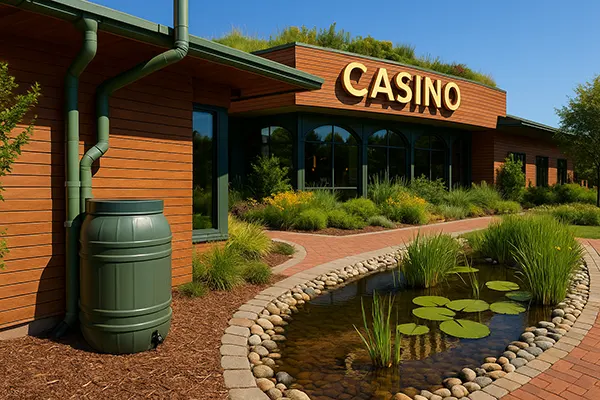
Ecological Footprint of Casinos: Can the Industry Become Green?
The gambling sector is traditionally associated with luxury, entertainment, and energy consumption, but in recent years, it has also become part of discussions around sustainability. As the world shifts towards greener practices, the question arises: can casinos reduce their ecological footprint and contribute to a more responsible future? In 2025, this issue is particularly relevant as both land-based and digital operators face increasing pressure from regulators and environmentally conscious players.
Energy Consumption and Renewable Solutions
Casinos are among the most energy-intensive entertainment venues, with slot machines, lighting systems, air conditioning, and digital equipment consuming enormous amounts of electricity. In regions such as Las Vegas or Macau, entire districts depend heavily on power, creating a visible environmental burden. However, many operators have started investing in renewable sources to reduce their reliance on traditional energy grids.
Solar power has become a leading choice, especially for large casino resorts located in sunny climates. Panels installed on rooftops or nearby facilities now supply a considerable portion of daily energy needs. Wind energy projects and partnerships with local green providers are also becoming more common, signalling a structural shift in how the industry views sustainability.
At the same time, energy-efficient technologies, such as LED lighting, motion sensors, and advanced HVAC systems, are being adopted widely. These solutions lower operational costs and significantly reduce emissions, aligning casinos with broader global climate goals.
Practical Examples of Sustainable Transitions
Some of the world’s largest casino operators have already introduced ambitious sustainability strategies. The MGM Resorts Group in the United States, for instance, has invested in one of the largest solar energy arrays in Nevada, covering substantial portions of its energy demand. Similarly, operators in Europe have moved towards purchasing only certified renewable electricity.
Digital gambling companies have joined this trend as well, relocating their servers to data centres powered by green energy. The switch to cloud solutions with carbon-neutral providers has become an important part of the sector’s modernisation. By combining technological innovation with environmental awareness, the industry is showing that significant improvements are achievable.
These examples demonstrate that the transition towards greener operations is not just theoretical. They highlight that even energy-heavy businesses can adapt and operate responsibly in today’s eco-sensitive environment.
Waste Management and Resource Efficiency
Apart from energy, casinos generate a large volume of waste, from single-use plastics and food leftovers to promotional materials. Addressing these issues is key for building a reputation of responsibility and aligning with sustainability standards. In 2025, many operators are implementing comprehensive recycling programmes and banning disposable plastics altogether.
Food waste is another major challenge for casino resorts, which often host large restaurants and buffets. To tackle this, several companies have partnered with local charities to redistribute unsold meals, while others employ advanced composting systems to convert waste into fertiliser. These steps not only reduce environmental harm but also benefit local communities.
Water usage is another important factor. Casinos with hotels and large-scale facilities rely heavily on water for pools, cleaning, and daily operations. Modern water-saving technologies, such as low-flow fixtures and recycling systems, are now increasingly common, ensuring a more sustainable use of this limited resource.
Innovations in Sustainable Hospitality
Hospitality plays a central role in casino operations, and it is here that some of the most interesting sustainability initiatives appear. For example, many operators have switched to digital systems for check-ins, loyalty programmes, and marketing, drastically reducing paper use. Others provide guests with refillable water stations instead of bottled water, cutting down on plastic waste.
Eco-friendly construction materials are another growing trend. New projects increasingly rely on certified wood, recycled materials, and designs that meet global green building standards such as LEED. By embedding sustainability at the design stage, casinos reduce their ecological impact before operations even begin.
These efforts are not merely symbolic gestures. They bring measurable results, helping operators reduce costs and enhance their corporate image while responding to regulatory requirements and player expectations for environmentally responsible services.

The Role of Regulation and Consumer Pressure
The ecological transformation of the gambling sector is strongly influenced by governmental policies and consumer behaviour. In 2025, environmental regulations are becoming stricter worldwide, pushing operators to adopt greener practices or risk fines and reputational damage. For instance, the European Union enforces sustainability reporting obligations, while in the United States, several states have introduced carbon reduction targets that directly affect casino resorts.
Players themselves are increasingly conscious of sustainability. Surveys reveal that younger audiences, especially Millennials and Generation Z, prefer to support companies that demonstrate clear environmental commitments. Casinos that integrate sustainability into their brand strategies are therefore more likely to retain loyalty and attract new players.
Collaboration across the sector is also growing. Industry associations are developing shared frameworks for sustainability reporting, while research institutions are exploring innovative ways to balance entertainment with ecological responsibility. Together, these efforts signal a long-term shift towards an environmentally conscious industry.
Future Prospects for a Green Casino Industry
Looking ahead, technology will continue to play a key role in shaping the ecological footprint of casinos. Smart grids, AI-driven energy management systems, and blockchain-based supply chain monitoring are among the tools that could revolutionise the industry’s sustainability standards. Digital casinos, with lower overhead and infrastructure costs, are also expected to lead in adopting carbon-neutral solutions.
The growing link between corporate responsibility and financial performance means that sustainable operations are not only good for the planet but also for long-term profitability. Investors and stakeholders increasingly demand transparency in environmental practices, making sustainability a strategic business imperative.
Ultimately, while challenges remain, the path towards greener casinos is becoming clearer. By combining regulatory compliance, technological innovation, and consumer-driven change, the industry has a realistic chance to significantly reduce its ecological footprint in the coming years.
